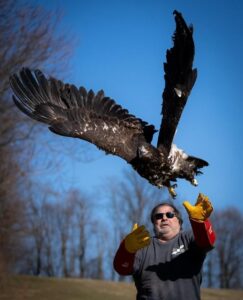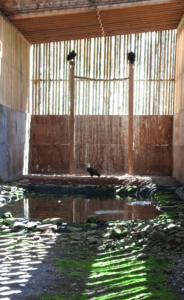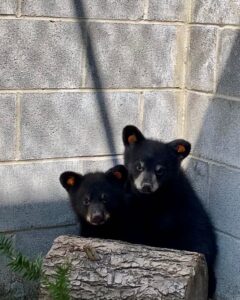Spotlight on Animal Heroes:
Friends of Feathered and Furry Wildlife Center


In the early 2000s, after husband and wife Dave LoBerde and Missy Runyan moved to the Catskills, Missy’s desire to help animals eventually lead her into wildlife rehabilitation. Soon they established the Friends of Feathered and Furry Wildlife Center on their large piece of land and were dedicating their lives to helping sick and injured animals heal, releasing them back into the wild.
Over the years, not only was space created for smaller animals and birds, but Dave, a former mason, along with dedicated volunteers, built a large bear rehab building, as well as a 100-foot long flight cage, required by federal law to rehabilitate eagles, one of the few such facilities around. It is an awesome sight to see the eagles as they fly back and forth in this space.
At FFFWC, the guiding philosophy is to always remember the animals are wild and treat them as such, not something to be cuddled or habituated to humans, and to return them to where they belong — never to keep any caged indefinitely. “Let wild be wild” is their motto.
Sadly, in late 2021, Missy, who had gained wide respect and love as a rehabilitator and educator, passed away suddenly. Dave and the Center’s faithful volunteers knew they must carry on her work and to continue caring for the animals and educating the public about protecting wildlife.
Dave told us he receives about 20 calls a day and responds to as many as possible. The calls about injured or orphaned animals range from birds of all sorts and small animals to fawns and bears. Although FFFWC does not accept rabies vector species (RVS), such as raccoons and skunks, he can recommend rehabilitators who are equipped and licensed to deal with them.

He is grateful for the loyal team of volunteers who help care for animals at the facility, transport, and help capture animals if needed, and the veterinarians who often donate their skills. They also work closely with the DEC and Cornell. This work continues 24/7 all year.
He usually has several orphaned cubs at one time in the huge bear building — once had 11. They can only take in bear cubs that are 60 lbs. or less. The cubs are born the same time of the year, so all are around the same age during rehab. He says, as youngsters who haven’t reached sexual maturity, they get along and have a grand time together. When ready to release, the DEC transports them to state land in the area where they were found. They also work only with fawns, as adult deer react very badly to captivity, dangerous to themselves and to the people trying to help.
Dave said that big challenges now to wildlife are lead poisoning, bird flu, or West Nile virus. Many eagles have ingested lead pellets and are disoriented or having seizures. If they reach the rehab center early enough, treatment if often successful and they can be released. FFFWC has worked with hunting groups educating them about the dangers to wildlife from lead shot, and sometimes successfully persuading some to use a less harmful ammunition.
The wild birds and mammals, who are subject to so many calamities – hit by cars, human encroachment into their areas, fires, being orphaned, lack of adequate food, etc. – are very fortunate to have the dedicated volunteers and facilities at Friends of Feathered and Furry Wildlife Center who give so many a second chance at life.
FFFWC, a 501-c-3 organization, receives no government funding and relies on donations. Buying medications and supplies, not to mention the expense of feeding hungry bear cubs, is quite costly. If you would like to help, donations can be sent to FFF Wildlife Center, 10846 Rt. 23A, Hunter, NY 12442, or you can donate online at their website, fffwildlifecenter.org.
New York State Humane Association Humane Review, Vol. XLIV, Fall 2024.